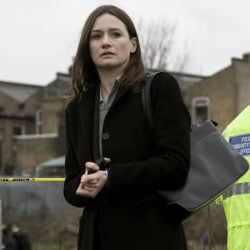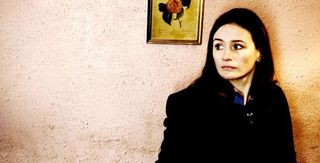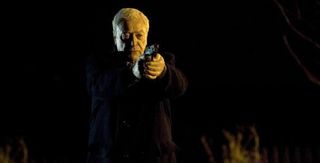Interview: Harry Brown's Emily Mortimer

It’s a good thing I really enjoyed Harry Brown, otherwise I would have hounded Emily Mortimer with questions about Transsiberian. Mortimer’s characters in the two are actually somewhat similar; they’re very feminine women, but both have a particularly tough side. In Transsiberian she stars as Jessie, a young woman traveling from Beijing to Moscow via train who gets caught up in a drug smuggling effort. When she’s pegged with the goods she has to go up against an intimidating narcotics officer played by Ben Kingsley.
In Harry Brown, Mortimer is not only on the other side of the law, but she trades Sir Ben for another Sir, Sir Michael Caine. Caine plays the titular character, an older man living on an estate in South London. After his wife passes away and his close friend is murdered, he decides he’s had enough with the violent youths tormenting his neighbors and arms up to takes matters into his own hands. Mortimer steps in as DI Alice Frampton, the officer investigating the case of Harry’s late pal and the only one on the force who suspects Harry of committing a string of noble atrocities.
Frampton spends most of her time keeping a close eye on Harry, but eventually gets in on some of the action herself. Take a look at what Mortimer had to say about her brutal battle scene, omitted details about her character and the excessive on-set giggling.
How’d you get involved in the film? Did this script find you or did you seek out this part?
No, the script found me. They didn’t offer it to me directly, I met them for it, but I read the script and I was immediately very intrigued and interested in doing a film with Michael Caine and just having an opportunity to have a few scenes on celluloid with him was something I wasn’t going to pass up in a hurry. But then I met Daniel [Barber], the director, and I saw the short film that he made called The Tonto Woman. Any concerns that I might have had about the script, you know, I was anxious that even though it was very gripping and interesting and I liked the conceit of this septuagenarian vigilante, I was nervous that there was sort of a cop drama feel to it that could feel clichéd a little bit because we’re so familiar with that genre from just 25 channels of cop drama on our televisions like every night. And then I went and met Daniel and I realized that he was definitely going to elevate it sort of beyond that somehow, that he was using as his muzzle this Western genre and I got psyched by the idea of that and the fact that I was kind of the sheriff. If Michael Caine was the outlaw and vigilante then I was like the sheriff, I was the sort of Tommy Lee Jones character.
Rather than being that caricature of a rough and tough cop, your character has a very vulnerable side and comes across as more of a real person. Was that something you saw in her even before filming when you had only read the script?
It wasn’t really clear what she was; there was a lot open to interpretation in the script because she’s quite this sort of self-possessed character. She’s a woman of few words, you know? But I think you could have gone a lot of different ways with it and I think I was quite aware of that, that I didn’t want to be – Helen Mirren is so brilliant in Prime Suspect, just so beyond brilliant, but it’s almost become a cliché now that kind of ball-breaking tough woman in a man’s world kind of thing and I definitely wanted to get it away from that and just feel like this was that character, but from a different era kind of thing. Although there’s massive sexism in the police force still, it’s much more complicated and kind of gray area than it was, I think. It’s more difficult to navigate or less clear-cut and, yeah, so that was something I was always aware of.
CINEMABLEND NEWSLETTER
Your Daily Blend of Entertainment News
Was there more to her personal story than what was shown in the film?
Yes. There was. You picked up on something! [Laughs] She talked about her father being a policeman and being a military policeman and so she’d gone all over the world with him and it was clear that she was a vocational policewoman that had got into it because it was kind of family, you know, following in the footsteps of her father and that she had inbred in her a feeling that the law is something that she values and really genuinely believes that it can be used to protect society and that she could be a force for good. But she also understands the military, that was interesting as well, that she had an understanding of the military and in some ways when she realized that Harry was an ex-marine it, on the one hand, kind of made her more wary of him as a potential killer, but at the same time, it made her feel more bonded to him because her father had been in the military and she was familiar with that world. What I was interested in as well was the complexity of the relationship between Harry and Frampton and on the one hand, she’s the pursuer and he’s the pursued and she’s the policeman and he’s the criminal, but they have an understanding and there’s something that feels like a father-daughter relationship, sometimes there’s something almost sexual about it. There was a lot of potential for subtext going on and I’m sure not nearly all of that is apparent in the film [laughs], but it was good to have it in my head at least.

That was my one main criticism of the film. We wanted more from your character.
Oh, that’s nice! I think it’s often the way with movies; there seems to be fewer and fewer minutes to tell a story on film these days, you know? It’s difficult to sell a film that’s long and audiences are getting more used to a certain length of movie experience. They had to edit it and then you have to choose which stories you tell and Harry’s the central character and the whole force of the film is based on his story, so I guess some things have to go. There was more of a back story that isn’t quite there that maybe would have explained more about their relationship in a way through the movie, but I think it still is there, it’s just sort of more subtextual I guess. [Laughs]
You’re involved in pretty low key moments the entire film and then in the end just get thrown into this whirlwind of action that seems so physically and emotionally demanding. How was that?
It was physically and emotionally demanding! [Laughs] As you rightly have said. Normally those things are kind of quiet boring because it’s on and on and on, endless, endless days of being in the same location and trying to get these action sequences right and you don’t actually see that much action in the end because you have stunt people that are doing it and you just sort of sit around smoking cigarettes and drinking tea and waiting for it to end so you can get on and do some proper acting. But this was different; it was filmed in a real pub in the East End of London, a really dive-y, dirty, old pub that stank of kind of old man’s wee and cigarettes and beer and cat piss and I was lying on the floor for like a week and a half being strangled and kicked and whatever by various stuntmen and actors and it was a really unpleasant carpet to lay on for that length of time. The stunts, they weren’t really stunts; we were just sort of doing it. There was one point where my neck was actually being used as my neck off camera while Ben Drew’s character strangled me. It just shows how pathetic I am, but it took me about three takes before I finally sort of piped up in this sort of meek voice that maybe they might substitute my neck for some sandbag or something. [Laughs] He was definitely in the moment, you know? He wasn’t on purpose hurting me, but because it’s quite hard to put your hands on someone’s neck without sort of gripping to some extent and I had a bloodshot eye at the end of it. I broke blood vessels in my eye! I guess I was so trying not to get strangled and straining that every vein in my body was straining to prevent this guy from suffocating me. It was kind of intense and it was really cold, depressing, rainy London in January weather. So it was as grim as it looks. [Laughs]
I spoke with Michael yesterday and he told me he knows you from when you were young. What’s your earliest memory of him?
Well, I can remember, he probably doesn’t remember this, but I can remember very clearly that everybody was very excited because he was meant to be coming to a party at our house for lunch. I was a little girl, about eight or something, and my dad had a secretary who had a tendency to down the dregs of all the wine glasses. She would take them back into the kitchen to get them refilled. [Laughs] And she got completely drunk. Michael Caine apparently rung up, I can remember being in the kitchen and hearing him on the phone, it was Michael Caine who rung up to say that he couldn’t find the way and he said he was in a village, which was very near to our house and Marion answered the phone completely drunk and told him that he was completely lost and there was no way he was ever going to be able to find his way to our party. She strongly advised him to turn around and go straight back to London. And that’s the memory I have of him not coming to our house because my dad’s drunk secretary told him it would be best advice to give up on us completely and turn around and go home. [Laughs] We were all so upset and so disappointed!

Had you ever worked together before Harry Brown?
Never. No. And I hope I get to again; he’s such a treat. He’s such a nice person to be around and I really think he’s dodged bullets as far as acting is concerned, but on top of that he’s just such a sweetheart and so easygoing and funny and excellent.
He told me a number of the boys in the film weren’t professional actors, they were actually kids living on the estate.
Yes! And a lot of them had lived lives that were not too dissimilar to those of the kids they were playing. I think that was also part of what made the film really exciting to be in was getting to act with those guys who were really the real deal, but also incredible actors and very nice guys. The scenes in the interrogation rooms were all improvised between us and that was so exciting because they really knew what they were doing in terms that they had a lot of experience to call upon and I had spent a lot of time with this police detective lady in East London and so I had seen a lot of these interview scenes. They were exciting scenes to film.
Did the atmosphere on set reflect the intensity of the material? Did you ever have the chance to just relax and have some fun?
Michael is a giggler and it takes one to know one and when you can tell that someone’s got the tendency to giggle, it’s deadly if you have. I was told at one point in the film when I have the car crash at the end, I’m told by the stunt guy that I would have had a terrible case of whiplash as a result of the car crash and so I must remember that I would always have my hand up to my neck to support my neck, otherwise I would be in just terrible agony and I wouldn’t be able to support my neck, so I was careful that I was going to forget. I had two weeks of filming the same sequence and the stunt guy goes off home when he’s not required so I was thinking, “Am I going to fucking forget to put my hands to my neck?” And I got so paranoid that I would that I ended up just capping my hand on my neck pretty much the whole time. I’d go into the loo with my hand on my neck and I’d sort of drink a cup of tea with a hand on my neck and it just became glued to my neck because I was so scared of forgetting to do it. And Michael just would take the piss of me and he’d walk into the room and just take one look at me and go, “Get that bloody hand – would you bloody get that hand off your neck! What the – how do you think you look like?” And it became a running joke and, of course, we had to film that and he first pulls me and my sergeant out of the wreckage of our car and he comes through this sort of shadow in the mist and I just had this car crash and I turn to look at him and I’ve got my hand on my neck and I turned to look at him in this sort of intense way, finally the vigilant and the sheriff are face-to-face, and there I am and I look at him and he looks at me and I’ve got my hand on my neck and we just couldn’t stop laughing. And it was awful because I couldn’t not have my hand on my neck because it was the whole point, but I basically just buggered up the sequence by being so method. [Laughs] Throughout the two weeks that we were filming the sequence he thought we were totally ridiculous basically and I couldn’t look at him without pissing myself laughing and he could not look at me without pissing himself laughing and it took a very long time to get that shot right as a result
Staff Writer for CinemaBlend.
Most Popular







